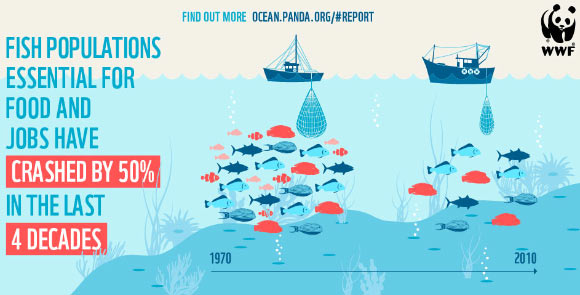WWF’s Living Blue Planet Report provides the most accurate picture of the state of the ocean, and the results are not very good. The report, released every two years, shows a decline of 49% of marine populations between 1970 and 2012. The analysis tracked 5,829 populations of 1,234 marine species, making the data sets almost twice as large as past studies.

Green turtles swimming in the Great Barrier Reef, Queensland. Image credit: © Troy Mayne.
“We urgently published this report to provide the most current picture of the state of the ocean. In the space of a single generation, human activity has severely damaged the ocean by catching fish faster than they can reproduce while also destroying their nurseries. Profound changes are needed to ensure abundant ocean life for future generations,” said Marco Lambertini, Director General of WWF International.
The Living Blue Planet Report 2015 indicates that marine species critical to human food security may be suffering the greatest declines. Underscoring the severe drop in commercial fish stocks, the report details the loss of 74% of the family of popular food fish that includes tunas, mackerels and bonitos.
These findings are based on the Living Planet Index, a database maintained and analyzed by researchers at the Zoological Society of London.
Adding to the crisis of falling fish populations, the report shows steep declines in coral reefs, mangroves and seagrasses that support fish species and provide valuable services to people.
Over 30% of fish tracked by the report rely on coral reefs, and these species show a dangerous decline of 34% between 1979 and 2010.
According to the report, coral reefs could be lost across the globe by 2050 as a result of climate change. With over 25% of all marine species living in coral reefs and about 850 million people directly benefiting from their economic, social and cultural services, the loss of coral reefs would be a catastrophic extinction with dramatic consequences on communities.

Decline in fish populations. Image credit: WWF.
“The ocean is an integral part of our lives. We are kept alive by the clean air, food and other services it provides. More than that, we are simply drawn to the ocean and its wildlife, whether a trip to the seaside or an encounter with the penguins at the ZSL London Zoo,” said Ken Norris, Director of Science at the Zoological Society of London.
“This report suggests that billions of animals have been lost from the world’s oceans in my lifetime alone. This is a terrible and dangerous legacy to leave to our grandchildren.”
While over-exploitation is identified as the major threat to ocean biodiversity, the report finds that climate change is causing the ocean to change more rapidly than at any other point in millions of years.
Rising temperatures and increasing acidity levels caused by carbon dioxide aggravate the negative impacts of overfishing and other major threats including habitat degradation and pollution.
Beyond the obvious harm to nature, threats to the ocean risk annual economic output of at least US$2.5 trillion and an overall asset base of at least $24 trillion, as found by a previous study.
“The fortunate news is that solutions do exist and we know what needs to be done,” Lambertini said.
The report details opportunities for governments, businesses and communities to secure a living ocean.
Important measures to preserve ocean resources include preserving and rebuilding natural marine capital, wiser consumption and prioritizing sustainability.







